#humans of basque country
Explore tagged Tumblr posts
Text

Same-sex marriage in 2003 vs. 2013 vs. 2023
(20 years of change)
More info below:
----
2003:
Marriage : Netherlands, Belgium, British Columbia (CA), Ontario (CA)
Civil unions : France (including overseas territories), Germany, Denmark, Iceland, Sweden, Norway, Finland, Greenland, Rio Negro (AR), Ciudad de Buenos Aires (AR), California (US), New York (US), Hawaii (US), Vermont (US), Canary Islands (ES), Aragon (ES), Catalonia (ES), Andalusia (ES), Extremadura (ES), Castilla-La Mancha (ES), Castilla-Leon (ES), Madrid (ES), Valencia (ES), Asturias (ES), Basque Country (ES), Navarre (ES), Balearics (ES), Quebec (CA), Alberta (CA), Manitoba (CA), Nova Scotia (CA), Geneva (CH), Zurich (CH), Portugal.
----
2013:
Marriage : Netherlands, Belgium, Canada, Brazil, Uruguay, Argentina, South Africa, Spain, Portugal, France (including overseas territories), Denmark, Norway, Sweden, Iceland, New Zealand, Washington (US), California (US), New Mexico (US), Minnesota (US), Iowa (US), Maryland (US), DC (US), New Jersey (US), Delaware (US), New York (US), Connecticut (US), Rhode Island (US), Vermont (US), Massachusetts (US), New Hampshire (US), Maine (US), Hawaii (US), Mexico City (MX), Quintana Roo (MX).
Civil unions : Greenland, Colombia, Ecuador, Merida (VZ), United Kingdom, Ireland, Germany, Czech Republic, Austria, Finland, Hungary, Slovenia, Croatia, Switzerland, Luxembourg, Liechtenstein, Australia
Recognizes marriages performed abroad : All 32 Mexican states and Israel
----
2023:
Marriage : Netherlands (including overseas territories), Belgium, United States, Canada, Mexico, Costa Rica, Cuba, Puerto Rico, Colombia, US Virgin Islands, Ecuador, Brazil, Argentina, Uruguay, Chile, Malvinas/Falklands, France (including overseas territories), Spain, Portugal, Andorra, Germany, Slovenia, Switzerland, Austria, Malta, Guernsey, Jersey, United Kingdom, Isle of Man, Ireland, Gibraltar, Norway, Denmark, Sweden, Finland, Iceland, Greenland, Luxembourg, Faroe Islands, South Africa, Australia, New Zealand, Taiwan, Northern Mariana Islands, Guam, St. Helena, Pitcairn Islands, Gibraltar.
Civil unions : Bolivia, Italy, Cayman Islands, Bermuda, Aruba, Curaçao, Czech Republic, Hungary, Croatia, Montenegro, Greece, Cyprus, Estonia, Liechtenstein
Recognizes marriages performed abroad : Namibia, Israel, Nepal, American Samoa
----
Future :
Same-sex marriage is under consideration by the legislature or the courts in Aruba, Curaçao, the Czech Republic, Estonia, Greece, India, Japan, Liechtenstein, Namibia, the Navajo Nation, Nepal, Thailand, and Venezuela, and all countries bound by the Inter-American Court of Human Rights (IACHR), which includes Barbados, Bolivia, Dominican Republic, El Salvador, Guatemala, Haiti, Honduras, Nicaragua, Panama, Paraguay, Peru, and Suriname.
Civil unions are being considered in a number of countries, including Lithuania, Peru, the Philippines, South Korea, Ukraine, China, Hong Kong, Japan, Latvia, Panama, Romania, Serbia, Slovakia, Thailand, and Venezuela.
----
#map#maps#cartography#usa#latin america#mexico#data#americas#geography#europe#gay#lgbt#gay marriage#lgbtq#lgbtq history#lgbt history#history#lesbian#sapphic#marriage#pride
7K notes
·
View notes
Text
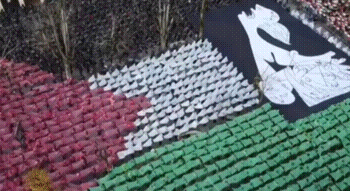
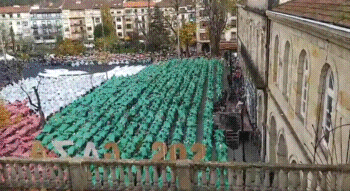
December 8, 2023 - Hundreds of people gathered in Guernica, Basque Country, to form a human flag in solidarity with the Palestinian people, as air raid sirens filled the air. The town of Guernica became symbol and a rallying cry against war crimes and the slaughter of civillians after German and Italian planes bombed the town for Franco's fascists in 1937, during the Spanish civil war, killing hundreds of innocent civillians. [video]
#guernica#gernika#basque country#euskal herria#solidarity#free palestine#flag#palestine#palestinian flag#anti-war#occupation#apartheid#spanish civil war#spain#antifa#antifascism#antifascist action#2023#gif#gaza
2K notes
·
View notes
Text
Today (Oct 15 2024) Spain finally annulled the so called "double count" for Basque prisoners.
In 2008, the EU passed a mandatory law for all members that recognised the years spent in a member country prison as due if the prisoner had another sentence in other member country for the same crime. Easy example, if you were judged and imprisoned for being a terrorist in France and sentenced to 20 years, and you were accused of the same crime in Spain and sentenced to 25 years, the law establishes you only have to be imprisoned for 5 years in Spain since you already served.
Since 2008, Spain has been ignoring this law and when Basque prisoners completed their sentence in France, they were brought to Spain where their prison time started from scratch.
These days before the law was passed - again, it was long due!! - the right wing has been saying that this is unacceptable and that the Spanish Government is giving in to terrorists. Because Human Rights who?
16 years have passed without implementing the European rules, and during all this time many prisoners have seen their rights trampled on just because Spain wants to punish them its way. Again, this is not a plea defending Basque terrorists. They're the ones who broke the law, the state should guarantee it. But the Spanish Justice system has been is a Revenge system when it comes to Basques.
#euskal herria#basque country#pays basque#pais vasco#euskadi#spain#current events#politics#repression#news#oh well
192 notes
·
View notes
Text

French Miku
She's protesting. Oh, she threw a cobblestone at a cop... She started a fire... She found Darmanin and put him in the fire... She's unstoppable... She overthrew the government and declared the 6th republic... Truly, an icon.
(Translation of the flag's text: "Kill the rich!")
I really like seeing everyone share their culture with Miku, and I wanted to do the same. However, I faced an issue: I didn't know how to represent the French culture. We do not have traditional clothing. Some regions have their own traditional clothing, like Bretagne, Basque, Corse, but not the country. There are all the fashions associated to France, but there are all for the aristocracy (like robe à la française) or the bourgeoisie, and that's neither the majority of the French pop (aristocracy was 1% of the pop) or me. My ancestors weren't these people, I am not these people. But I didn't know how to make a French Miku I could look at and think "She's French".
I thought about doing an Auvergnate Miku. Auvergne is my region, and I love my region, I could talk for hours about my region. And I always have to defend it because it's a rural region and other french are rude af to us. So, I had an idea for an Auvergnate Miku, even tho we don't have cultural clothing. But, Auvergne is a random French region and, as much as I love it, nobody gives a fuck about it in the grand scheme of things.
Then, I remembered, while reading the news about the French government being awful: France is known for its love for revolts and revolution. And so, here she is, French Miku, wearing a safety vest but wearing a mask to hide her identity from cops (ACAB), a bag to held first aids equipment and food for the picnic afterward. Some pins' of the CGT (a confederation of unions), some human rights association, the pride flag and the Kanaks' flag (because it's the current political issue regarding France and colonialism).
#hatsune miku#vocaloid#fanart#my art#traditional art#watercolor#colored pencils#“Death to the rich” is an actual slogan of the Revolution of 1789
44 notes
·
View notes
Note
What’s the deal with Basque. It’s a language isolate but are the Basque people like an “ethnic isolate”? Are the Basque people significantly genetically different than neighboring peoples? Is there any particular reason everyone else in Europe was either exterminated or assimilated by the Indo-Europeans, at least to the point that they adopted IE languages—but not the Basques?
Regarding genetics, I can't really say. Genetics is way outside my area of expertise, and looking online it doesn't appear that there's a real consensus. It appears that the general picture is that they have some amount of local hunter-gatherer ancestry and some amount of admixture from steppe populations, which is qualitatively the same as the rest of Europe. They may have these things in different proportions(?) than other European populations, or something like that; it sounds like a number of the studies disagree with each other. I think I'd have to have a better understanding of human genetics in general to give a more confident assessment of what is going on.
Linguistically speaking, Basque is the only non-IE language spoken in Western Europe today (Uralic languages, such as Finnish and Hungarian, are spoken in Eastern Europe, although they are probably later arrivals to the region than even IE), but it is not the only non-IE spoken in Western Europe within recorded history. The collective name for the languages spoken in the Iberian peninsula before the Roman conquest is the paleo-Iberian or Paleohispanic languages; of these, several were not Indo-European. Aquitanian in particular is generally identified as a direct ancestor of Basque. But there were also others, scantily attested, that may or may not have been related. These existed alongside Continental Celtic languages in the region.
There was also Etruscan, in Italy, which was non-IE. Etruscan civilization largely predated the Romans in the area and was highly influential on them; the Latin alphabet is principally adapted from the Etruscan alphabet (itself adapted from Greek), and Latin borrowed a number of words from Etruscan. Some of these have even made their way into English, for instance the very common word person, from Latin persōna "mask", possibly from Etruscan phersu "mask".
Anyway, whether or not any of these languages represent holdovers of the pre-IE linguistic environment in Europe is hard to say. For instance, some have argued that the Etruscans or their ancestors were actually late arrivals from somewhere south, possibly Anatolia. But I don't think there is any conclusive evidence for or against such ideas.
It is worth noting that ethnic and linguistic groupings very often don't align. Groups may remain ethnically distinct while adopting a majority language, or may remain linguistically distinct while losing a sense of ethnic identity, and so on. So genetic studies are often-useful-but-highly-imperfect proxies for linguistic relatedness, and vice versa. For instance, most of the "Negrito" peoples of South East Asia are highly genetically distinct from neighboring populations, but many of them speak Aslian languages related (distantly) to Vietnamese and Khmer. These languages are clearly distinct, but should not be misunderstood as holdovers predating the spread of genetically East Asian people to the region.
My understanding is that the evidence regarding Basque points to it being as pre-IE holdout in Western Europe. However, this need not say much about the genetics of the Basque people.
In any case, as to the question of "why" it held out when other pre-IE languages disappeared? I think it's kind of impossible to say. Presumably the mountainous and isolated nature of the Basque Country played a role; indeed all the studies I looked at seemed to say that genetically Basque people showed signs of isolation within the last thousand years or so, suggesting that they did not have as much contact with other European populations. But, beyond that, if you look at the fact that other pre-IE (or at least non-IE) languages survived in Western Europe until the historical period (Etruscan and some paleo-Iberian), it is perhaps not so surprising that at least one of them would make it to the modern day. Basque looks like a complete outlier now, but going back even 2000 years and there were a number of other languages in its position. In some sense the Indo-European migration into Europe was "not that long ago", on archeological timescales, so perhaps things like this are to be expected.
97 notes
·
View notes
Text
What a day man
If I had a euro for every time a fucking tourist family decided to scream at me for something I have no power or say over... (Add another euro every time an old guy makes some incredibly strange comment about me.)
Just. British tourists are fucking everywhere, and they're so, so disrespectful. Mass tourism is dreadful. I keep getting tiktoks where everyone is talking about how they're all vacationing in Spain and just. Where do we go if every building is being bought to use as a bnb?? I don't mind tourism, I just wish tourists had an ounce of respect.
A guy yesterday had the balls to tell me that he's paying a lot of money to live in Spain so that I can have this job. A month ago a guy told me "he was surprised that despite Spain being a rich country, barely anyone spoke English" and just. Spain has five official languages and you can study up to SIX in regular school (Spanish, whichever regional language you have, English, French is always available as an optional class, and if you study humanities you must take Latin and Greek classes) LIKE how many languages do YOU speak???
Other tourists at LEAST try to communicate in broken Spanish, they KNOW your average Joe doesn't speak German or Russian or Italian. But BRITISH tourists?? EVERYTHING is catered to them. EVERYTHING is for them. I'm so tired.
I'm the only person in my workplace with a C2 level in English so I have to take care of most of the talking.
Just. I'll be real and just say that I hate how English has become the lingua franca of the world. How you can't expect to achieve relevancy without speaking it. How I go online to hear about everything and anything to do with the US and then look away from my phone to deal with British tourists wearing "I <3 Benidorm/Mallorca/Madrid/Toledo/Granada" shirts.
I can barely get people to care about my first language and now I have to talk to people who don't even care about Spanish? Who don't try? Who throw an "Hola" and "Gracias" and then look puzzled when I speak Spanish? Who can't differentiate between the culture of the south, north, east and west of the country? Because I assure you, you will NOT find bullfighters and flamenco dancers and paella in proximity.
Do they know about Valencian? Catalan? Galician? Euskera? Basque? Do they know about Turrón? About the centuries we spent as Arab territory? Do they know? Do they care? Would they like to know?
Touristic cities are a paradox of being SO Spanish it's uncanny and also having not a single ounce of Spanish in them, it's all english breakfasts and italian/chinese/indian/etc restaurants and souvenir shops.
I saw a slideshow of a British guy taking pics posing next to "tourists go home" & "end mass tourism" graffiti and had to take a break from looking at my phone for the rest of the day
10 notes
·
View notes
Text
Ashen Wolves + Jeritza Modern AU HCs
Ashen Wolves in my fic (read it, it's funny) I couldn't fit everything in putting it all here
Yuri
Works at the bar Abyss (which has a secret BDSM dungeon in the basement)
Lives in a punk house with the others and unfortunately (but unsurprisingly) the only one responsible enough to pay rent
Everything else is a gamble. Will they have electricity this month? Water? Eh ¯\_(ツ)_/¯
“Hey wanna go out? I know a place” (takes them to the health food dumpster that tosses out perfectly good packaged food)
“Am I scared of twink death? Please.”
SWer out of necessity, sends most of the money he makes back to his disabled mom
(TW human trafficking mention) Yuri's father met his mother, a young poor vietnamese women. He promise he'd take care of her give her a better life in UK. Yeah right. Due to everything, she's extremely traumatized and unable to work.
Because of his and his mother's trauma, extremely protective of the most vulnerable in his community(women, children, immigrants, pwMI)
Balthus
New Jersey represent 🦅🦅🦅🦅🦅
Italian-American. Always correcting everyone on how to actually pronounce Italian words
Got into a tinyyyy minor disagreement with the mob and, in short, he owes them like gazillion dollars
Half-ass faked his death (so much party city fake blood) and is hiding out in Europe
He wears a fake mustache and puts on a fake Italian accent whenever he's in public
Sells drugs to the Garreg Mach kids.
“Balthus get a job.” “I have a business” “Isn’t that why you had to leave the States?”
The only one not to have a room. He sleeps on the couch (he had an air mattress. Had.)
Constance
In the late 1800s/early 1900s, her ancestor founded Nuvelle Inc., a pharmaceutical and biotechnology corporation
Her great-grandfather publically sided with the Republicans in the Spanish Civil War since he was in support of Basque Independence. Later assassinated by the fascist government in retaliation
Later, Constance's grandfather got backstabbed by his board and fired from the company
Her family was in denial about the whole thing and desperate to keep up with the appearance of wealth and continue to spend a lot of money. By the time Constance was born, they was in loads of debt
(tw suicide mention) Lost her mother in an accident. Then her father committed suicide, leaving Constance an orphan by 13.
Used the little inheritance she had to go to Garreg Mach and pretend everything was ok. Would lie anytime someone asked about her home life. Was forced to drop out at 16 because she ran out of money. To embarrassed to ask for help, she lied to everyone and told them she was going to study in the states
Yuri found her sleeping on a bench and took her in. Offered to buy her a ticket home until she finally admitted she lost everything and has no home to go back to
Dumpster drives at Garreg Mach for designer clothes. Ridiculous how much these rich kids (Hilda) toss out
Hapi
Romani :)
Ran away from home when she was a teenager to “see the world.” Unfortunately, got taken in by some questionable people
Cordelia found her and just felt so bad for her :( “oh no, a poor brown girl in need of help.” Offered to take her in and promised to help her get back home
Bullshit.
Finally able to run away and flee the country. She meets Balthus and Yuri because they were dumpster diving at the same spot.
She and Constance have this thing of getting naked and howling at the full moon each month
Emile Jeritza
Born into a religious cult in good old USA 🇺🇸 His father was the cult leader and had multiple wives.
His mother had a child from a previous relationship. Despite having numerous half-siblings, Emile was only close to Mercedes. She was the only one who didn’t scold him for crying and having “feminine” feelings after all
One day, his mother and beloved sister disappear. He never even got to say goodbye..
unbeknownst to him, when his mother and sister left they were fleeing for their lives. His mother immediately started to fight for custody of him but she was not an American citizen (while Emile and dad were) and she was trying to take him back to Europe
When Emile found out about what his father did, he…
On the run from the FBI :)
The wolves know about his history but fuck his dad, mofo had it coming.
Yuri was standing behind Jeritza at the store when he saw Jeritza didn’t have enough money for food and cat food. He told the cash register to put the sandwich back. Yuri bought him the sandwich.
#fe3h#fe3houses#ashen wolves#three hopes#three houses#fe16#fire emblem#fire emblem three houses#yuri leclerc#constance von nuvelle#balthus von albrecht#hapi fire emblem#hapi fe3h#usaigi speaks#fire emblem fanfiction#fire emblem headcanons
35 notes
·
View notes
Text
Semi-Finals, Match Two: Matej Mohorič v. Jonas Vingegaard


Matej Mohorič Propaganda
Jonas Vingegaard Propaganda
He is CUTE, he is SMOL, he has a CUTE NOSE and FRECKLES and EYES AS BLUE AS THE ENDLESS SKY---
OK no but seriously, he's amazing. As absurd as it can sound since this is one of the best riders in the world, he's always the underdog in people's minds. Somehow, no one ever thinks "OK I think Jonas is going to win this stage today", and when he does, they're like "OK he won but he still wasn't out of this world, it's because the others were having a bad day", and when he has a stellar day they're like "HE'S DOPING FOR SURE". It's like nothing he ever does is good enough and YET he doesn't give a fuck and keeps performing despite the pressure.
Being consistently good when everyone expects you to win is talent, but being consistently good when everyone hopes you'll lose is something else too.
And he's an incredible human being to boot. He's kind, he's compassionate, he's sensitive, he doesn't have a mean bone in him, he's affectionate, thoughtful. Remember that time during TdF 2022 when he asked Grischa to tell him if he could slow down at the end of the TT to let Wout win the stage? Yeah. He's that kind of guy.
More under the cut:
He's a crier. It's cute and it makes me want to hug him. He loves his family and he always has a good word for his rivals and he's humble and I relate so much to his introverted personality and he's a cinnamon roll and a cutie patootie. But when he puts on his sunglasses, he looks like A WAR MACHINE.

(but a cute one)
He got a lot of heat when he didn't wait for Sepp on the Angliru during this Vuelta, only the instructions of the team before that clusterfuck stage were to battle it out between them and he probably liked it even less than us because he wanted Sepp to win the Vuelta from the beginning.
And need I say anything about the absolute sportsmanship of this man? When he lost his balance in the Col of Spandelles, TdF 2022, Tadej didn't miss the opportunity and powered away from him, but when Tadej was the one who crashed two minutes later, he waited for him. HE WAITED FOR HIM.
And he made the sport all the better for it and gave us one of the finest images in cycling history.
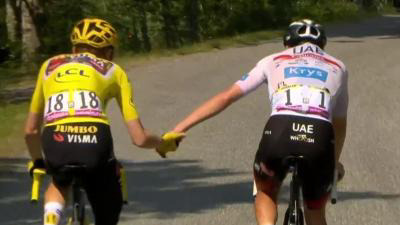
if you like MvDP, consider that though in these days when van der Poel is showing up with a mullet, Jonas did long hair earlier and better.

though there has been a change of style

If you like WvA, consider that some of the BEST hug pictures only exist due to Jonas being the kind of teammate whom others want to hug AND eminently sized for hugs/lifts

(we've all seen this but we can look at it again)
He's got sportsmanship. He's got incredible skills. He's even a dad! Maybe he's not always good at smiling for the cameras but he can sure smile for his family

Most importantly, he's a TdF winner with the time trial of the year and he cannot ride his goddamn bike without hands without his body language screaming oh god someone help me
youtube
#tumblr’s favourite cyclist poll#poll tournament#cycling#matej mohoric#jonas vingegaard#semifinals#Youtube
15 notes
·
View notes
Text
Okay buckle up I'm taking a break from weird anglo-saxon sewing to ramble about Old English terminology for a bit
@tansyuduri this is the term I had mentioned I wanted to tell you about re: nature spirits acting as intermediaries between realms
Lets talk about the word "Mearcstapa".
Its used once in Beowulf, in line 103, to describe the creature Grendel.
Grendel is, in brief, some kind of ambiguous creature and/or cursed human, descended from Cain, cursed by that descent to wander and "hold" (as in, treat as a stronghold) the wilderness forever. He has very little physical description except that he is very large and swordproof, and may have claws? Anyway, he isn't what I want to talk abt right now. For Once.
I'm going to take a stab at translating the OE text myself, VERY roughly, and provide some context for where the word appears.
"This grim ghost was called Grendel, famous mearc-stapa, he who holds the marshes, fen-as-fortress; the lands of monsters un-blessed he guarded for a while, since the Shaper* had him written in the race of Cain- whose torment was the Lord's vengeance, for he slew Abel."
(Beowulf lines 102-108, translation My Weird Gay Ass)
*a common OE term for God, meaning something between "shaper/maker" and "poet/singer"
(that is MESSY towards the end but I've never tried to translate Beowulf myself ok)
anyway it goes on about Cain for a bit after that, the usual stuff you can find in the bible, but what is a "Mearc-stapa"?
well, "-stapa" is really easy, its one of the words in Old English that changed relatively little into the modern day.
"-stapa" is "stepper". one who steps across, walks upon and generally treads over something.
ok cool. what's a "mearc"
WELL THIS IS WHERE THINGS GET REALLY REALLY WEIRD AND HARD TO TRANSLATE.
"Mearc" as a word and as a concept has not survived intact in modern English, at least not on its own. Its latest surviving incarnations are in the extremely-early-middle-english "March" or "Mark", so lets start there. I'm just gonna hit Wiki for this one:
In medieval Europe, a march or mark was, in broad terms, any kind of borderland,[1] as opposed to a state's "heartland". More specifically, a march was a border between realms or a neutral buffer zone under joint control of two states in which different laws might apply. In both of these senses, marches served a political purpose, such as providing warning of military incursions or regulating cross-border trade.
Marches gave rise to titles such as marquess (masculine) or marchioness (feminine) in England; marqués (masculine) and marquesa (feminine) in Spanish-speaking countries and the Catalan and Galician regions; marquês (masculine) and marquesa (feminine) in Portuguese-speaking countries; markesa (both masculine and feminine) in Basque; marquis (masculine) or marquise (feminine) in France and Scotland, margrave (German: Markgraf, lit. 'march count'; masculine) or margravine (German: Markgräfin, lit. 'march countess', feminine) in Germany, and corresponding titles in other European states.
Etymology[edit]
The word "march" derives ultimately from a Proto-Indo-European root *mereg-, meaning "edge, boundary". The root *mereg- produced Latin margo ("margin"), Old Irish mruig ("borderland"), Welsh bro ("region, border, valley") and Persian and Armenian marz ("borderland"). The Proto-Germanic *marko gave rise to the Old English word mearc and Frankish marka, as well as Old Norse mǫrk meaning "borderland, forest",[2] and derived from merki "boundary, sign",[2] denoting a borderland between two centres of power.
In Old English "mark" meant "boundary" or "sign of a boundary", and the meaning only later evolved to encompass "sign" in general, "impression" and "trace".
The Anglo-Saxon kingdom of Mercia took its name from West Saxon mearc "marches", which in this instance referred explicitly to the territory's position on the Anglo-Saxon frontier with the Romano-British to the west.
...cool. that was a lot. anyway, that's what a "Mearc" is, in the most basic sense (Beowulf being in the West-Saxon dialect mentioned above, specifically having been recorded mainly in the Late-West-Saxon written dialect known academically as Winchester Standard for reasons to do with some bishop whose name I'm not going to bother trying to spell)
however, in the context its used in Beowulf, "Mearcstapa", or "Mark-walker", becomes a REALLY weird term. See, Grendel isnt wandering around the boundaries between two towns, or kingdoms, or countries. He's just kind of out in the woods, some of which happen to border one singular, somewhat sizeable town that Grendel then regularly attacks. So what is he walking the border between?
Well, academics love to talk abt that lmao. Some people say it refers to land- or politically-based borders much LARGER than a country, and that it denotes Grendel as a foreigner, from another land or part of the world entirely. Some people see "Mark" as conjuring an image of a swampy, be-fogged "no mans' land" where settling and agriculture would be impossible. A wasteland, for human habitation at least, and thus an "in-between-place" in relation to the boundaries of human civilization- somewhere you travel through or around in between human-settled areas, where no laws of God or man apply. Its "The Dark Forest", the "Past The Threshold" in the Hero's Journey.
However, there's another widely discussed thematic meaning here, and it relies on a bit of context. Beowulf was recorded by monks in a time when Christianity was still relatively new to Northern Europe, the last remnants of various pagan religions only having been definitively wiped out a few centuries prior (FUCK YOU CHARLEMAGNE), and that's the time of RECORDING- Beowulf, as a story, had almost definitely been composed and passed down orally within those same preceding few centuries, likely in the 800s a.d. but possibly as far back as the 600s a.d. . So, what this means is that Beowulf is a record (imperfect as it is, being written down later and by monks) of a culture mid-transition between paganism and Christianity, and this isn't clearer anywhere than in another passage rambling on about Cain:
(in which I attempt to sloppily translate Beowulf again)
(picking up where we left off) "...no joy did he get from that feud, but was driven far away, ill-fated for his evil, far away from mankind. From thence all monstrous births awoke, jotun and elves and orcs*, those same giants who fought with God over long seasons; this was the recompense given"
(Beowulf, lines 109-144, trans. Me and 24/7 my spn brianrot)
*lit: "evil spirits" but the word is "Orcneas", Tolkein stole it and so will I.
(again, is this right? eh. mostly. the end got rough again)
so okay, lots of the usual Cain stuff, and some mentions of giants that some scholars have interpreted as relating to the Nephelim (more context there but its not relevant to this post). However, what may seem GLARINGLY out of place to anyone reading this passage about the BIBLICAL CAIN is the mention of JOTUN, ELVES AND ORCS.
and you'd be right! that is weird! and Grendel is a part of that!
so, with this context, it can be understood that the "Mearc" of Grendel's "Mearcstapa" has multiple meanings, to us anyway. For the Anglo-Saxon people who composed and passed down the story of Beowulf, the lawless and dangerous wilderness just outside their villages would have been one and the same to the lawless, dangerous world of heathen gods and monstrous creatures that their culture had so recently left behind. Uncontrolled forces and places that didn't respect the rule of man or God, untamed, just barely dispelled and always lurking at the edges. That is the "Mearc", as it is used here.
Mearcstapa, Mark-Walkers, Cain, whatever, happy Deanmon 10th anniversary yall.
Oh, on that note- some scholars/translators HAVE tried to argue for "Mearcstapa" as "Marked Wanderer", re: the Mark of Cain. However, they are more or less soundly overruled by the prevailing academic understanding of the term...
which is that the "Mark" is a liminal space that, in addition to being the actual areas between towns/cities and the place where monsters live, is also the barrier keeping remaining scraps of paganism (ie, perhaps other gods?) out of Christianity. And the descendants of Cain were set to patrol it. And that's something someone said in, AT THE LATEST, 1000 a.d.
why am I burdened with this knowledge.
#old english#beowulf#academia#medieval studies#linguistics#grendel#anglo-saxon#supernatural#deanmon#mythology#demon dean#dean winchester#sam winchester#cain#mark of cain#mearcstapa#cursed#this is a cursed ass post
6 notes
·
View notes
Text
why brexit happened? it was because outside of london where england is mostly white, the white people didn't want to have other white people entering england, that was the big complaint… what is my point. the white people of england don't like other white people let alone the non white. so what should be expected England left the european union based on negative bias which as a much more potent action … Negative bias, which is the correct term for this is throughout all humanity. Back to england, this issue has three parts, a white country: usa/uk/france , an non white athletes immigrant parents and the athlete themselves. I just explained that whites of england don't like other white people let alone the non white in the same way, the basque people can't stand catalonians or white southerners of the usa hate everybody else or muslims and indians kill each other in india or… negative bias from a major populace is common and expected. So whites in england being negative to non whites is merely an expected constant. So , now what is left is parents of these players, usually immigrants, and the players themselves. Parents of immigrants great crime usually is they forget to raise their children with the reality that they immigration wasn't for identity but money. People immigrate from fiscally poor countries to fiscally wealthy countries for the financial opportunity but unfortunately, most immigrant parents, raise their children to embrace the country they immigrated to on cultural grounds and that lie is devastating because these players parents didn't want to become british or american , they want opportunity to better their lives but chose to raise their children as if they are already wealthy and this is a cultural choice with non black or white friends in an england or usa to suggest what isn't true. So , the parents are partially to blame. Just because a nigerian or trinidadian child 's parents raised them in england doesn't mean they have to embrace england. And last is the players. Most of these players are surrounded by white children or white people their whole lives, their whole lives they want acceptance from whites and that goes into the flag teams like france/usa/england/canada or other.
I comprehend the tiktokers argument but you have three culprits. A non black country that loves to use blacks for its financial benefit hile hating blacks inherently. Black parents who lie to their children or raise them poorly concerning the issue of identity. Black children who are surrounded by whites aside impotent or foolish black parents raising them to want to be accepted by whites their entire lives, even when they don't need to. Yes, not all non blacks hate blacks and yes some blacks hate blacks. But the issue here is majority. At the end of the day, anyone human who says most in any community embrace those not in their community is simply lying.
#rmsoccer
2 notes
·
View notes
Text
Spanish Archaeology under the Franco Regime
During the regime of Francisco Franco, Spanish archaeology, and the sciences as a whole, experienced a period of isolation, which allowed Franco to exercise a great amount of ideological control. While the fascist regimes of Nazi Germany and Italy relied on the misrepresentation of pre-historical archaeology to support their ideas of racial superiority, the Francoist regime affirmed it’s nationalist superiority with the theoretical reunification of the Spanish state under the Catholic Monarchs during the Middle Ages (Díaz-Andreu, 75). Spanish nationhood was understood as an imperialist project undertaken by the Catholic Monarchs, and Catholicism was understood to be its backbone. As with all fascist projects, attempts were made to “prove” or trace the origins of the Spanish state into the Bronze Age, or more commonly, the age of Rome, although these projects were largely owned by individual archaeologists, rather than the regime itself (Díaz-Andreu, 76).
The Francoist regime’s apparent disinterest in archaeology did not prevent the field from being impacted by Francoist forces after the Civil War. Several archaeologists of prominence were killed in action during the fighting, made political prisoners, or fled from Spain during the war and refused to return. The Civil War led to the destruction of several regional archaeological institutes, as they were affiliated with ethno-national identities in Basque Country, Galicia, and Valencia (Díaz-Andreu, 76). As with most aspects of Spanish life during the post-Civil War Period, Madrid became the center of archaeological research and academic production, assisted by the destruction of regional institutions. The newly developed institutions in Madrid were quickly populated by Franciosts and falangists, the most notable being Julio Martínez Santa-Olalla.

Martínez Santa-Olalla occupied the lead role of the Comisaría General de Excavaciones Arqueológicas, Franco’s new administrative body of Spanish archaeology, and served as the chair of Ethnology and Prehistory at the University of Madrid. Martínez Santa-Olalla’s position as head of the Comisaría General and Department Chair in Madrid, granted him broad control over a variety of publications, all of which espoused Francoist beliefs. Martínez Santa-Olalla had fought on behalf of Franco during the Civil War as part of the falangist faction (Díaz-Andreu, 77). He visited and was invited to several conferences and universities in Germany, and spent time visiting with Nazi-affliated professors of prehistory. Martínez Santa-Olalla even attended excavations led by the Schutzstaffel (SS), during their attempts to connect German prehistory to the Nazi mythos of Aryan excellence (Mederos Martin, 9).
In addition to Martínez Santa-Olalla’s appointment, the directors of other departments and museums were quickly replaced with pro-Franco professionals, who worked to embed Spanish nationalist ideas into institutions that were once deeply committed to their regional identities. As these professionals worked to insert Francoist and fascist ideology into their works, post-Civil War Spanish archaeology became characterized by strong centralization and poor funding. Archaeology became a method by which fascists could support and endorse fascist ideas about human evolution, societies, and ethnography (Díaz-Andreu, 80).The evolution of Spanish archaeology into a vehicle for fascist ideology was only hampered by the Franco regime's preference for the Middle Ages, but it nonetheless dutifully occupied its role under the fascist government.
The emphasis on prehistoric archaeology was no coincidence. Some archaeologists used their expertise to argue for a prehistoric unified Spain, in order to support the work of Franco to diminish ethno-nationalist movements and to encourage the superiority of a Spanish national identity. While the Franco regime spoke of a deep interest in the Middle Ages, their interest was more deeply rooted in self-interest, as the Francoist story of the Spanish Middle Ages was better adapted to support Spanish nationhood. For Francoists, the Spanish nation was created when the last Christion monarchs in the north began a series of conquests, pushing Muslim leaders further and further south. These efforts culminated in the reign of the Catholic Monarchs, Isabel and Fernando, and their conquest of Granada, the last Muslim taifa. The story of conquest, or reconquest (reconquista) became a popularized method of understanding Spanish history and nationhood. Francoists were entirely uninterested with the Muslim kingdoms, which were present for the majority of Spain’s medieval history, and therefore, did not fund excavations or archaeological studies on the topic. For Spanish archaeologists, the prehistoric time was far more likely to receive funding or attention, whereas anything after the Islamic conquest in 711 was unprofitable (Valor and Gutiérrez, 6).
Under the Franco regime, Spanish archaeology was heavily centralized and focused on Spanish prehistory, in order to support Francoist ideas of national identity. It remained isolated until the 1970s, when universities began expanding. More positions became available, allowing some new ideas and theoretical frameworks to be introduced, although no institutional changes occurred until after the end of the regime. The introduction of new perspectives was slow, as author Margarita Díaz-Andreu remarks in her 1993 article Theory and Ideology in Archaeology: Spanish Archaeology under the Franco regime, “We will still have to wait for Spanish archaeology to show an effective change in the theoretical field”.
Citations:
Díaz-Andreu, Margarita. “Theory and Ideology in Archaeology: Spanish Archaeology under the Franco Régime.” Antiquity 67, no. 254 (1993): 74–82. doi:10.1017/S0003598X00045075. (requires subscription)
Julio Martínez Santa-Olalla. (n.d.). Real Academia De La Historia. https://dbe.rah.es/biografias/27622/julio-martinez-santa-olalla
Mederos Martin, Alfredo. “The National-Socialist Mirage. The Relationship between Two Professors of Prehistory, Oswald Menghin and Julio Martínez Santa-Olalla (1935-1952).” Trabajos de Prehistoria 71, no. 2 (2014): 119–220. doi:10.3989/tp.2014.12131. (requires subscription)
Valor, M., & Gutiérrez, A. (2014). The study of Medieval Archaeology. In The Archaeology of Medieval Spain, 1100-1500. Equinox Publishing Ltd. (requires subscription)
#archaeology#spanish archaeology#Julio Martínez Santa-Olalla#history#Francoist Archaeology#spanish civil war#Francoist Spain
2 notes
·
View notes
Text
LA PRENSA COLONIZADORA
Otra de los ADN de los descendientes de los aborígenes canarios, no lo había leído antes. @beautiful-basque-country
Un estudio genético descubre que vascos y bereberes tienen un origen similar...
Los españoles son más parecidos a los norteafricanos que a los europeos.
MALEN RUIZ DE ELVIRA
Madrid -24 NOV 1995 - 00:00 CET
El análisis genético comparativo de las poblaciones vascas, el resto de España, Cerdeña y Argelia ha llevado a la conclusión de que los genes de las poblaciones ibéricas iniciales predominan en los vascos, que en parte escaparon a las posteriores invasiones celtas, romanas y árabes. Entre sus antepasados, según los genes HLA estudiados por científicos españoles, predominarían los blancos norteafricanos de hace más de 10.000 años, de los que descienden los bereberes actuales. El resto de los íberos se mezclaron más con los invasores, especialmente celtas y árabes.
Mediante el estudio de la frecuencia de los genes HLA, se puede elaborar el árbol de relaciones de las poblaciones humanas a lo largo de la historia. Esto es lo que han hecho los investigadores liderados por Antonio Arnaiz, profesor de la Universidad Complutense, con vascos de San Sebastián, españoles de Madrid y argelinos de Argel. Estudios similares se están llevando a cabo en la población marroquí. Los HLA son genes altamente variables que se utilizan para identificar individuos en estudios de paternidad y poblaciones en estudios antropológicos y para seleccionar pares donante-receptor en trasplantes. En estudios anteriores se había encontrado que los vascos, sardos y el resto de los españoles están más cerca en el árbol de parentesco de las poblaciones africanas que del resto de las poblaciones europeas.
a través del estrecho
El estudio de los genes HLA en una población de Argel, el primero que se hace en este detalle, señala Arnaiz, muestra que los argelinos tienen un gran componente de genes de la población blanca paleonorteafricana (los bereberes actuales), que ocuparon el territorio del norte de África antes de las invasiones árabes del siglo 7. El parentesco genético de los argelinos resulta así muy cercano con la población española en general, con los vascos y también con los sardos, otra población que ha permanecido relativamente aislada, debido a su insularidad. Esto demostraría que los íberos poblaron en algunos tiempos preneolíticos en el norte de África o que los colonos blancos del norte de África cruzaron el Estrecho de Gibraltar hacia la Península Ibérica. Esto último sería más probable,
El origen genético común de vascos y argelinos coincide con las similitudes encontradas por algunos lingüistas entre las lenguas vasca y bereber, habladas por los miembros de esta etnia que actualmente viven en el norte de África.
Estos resultados han sido presentados en la conferencia sobre el Genoma Humano Europeo, celebrada los días 9 y 10 de noviembre en Barcelona, donde fueron corroborados, según Arnaiz, por otros dos trabajos, uno de ellos sobre el cromosoma Y de sardos y vascos, y otro con referencia a los argelinos. Los trabajos han sido publicados en revistas científicas, las últimas en Human Immunolog y Tissue Antigens, este año.
Para la muestra de vascos españoles se han tomado 82 personas de San Sebastián con apellidos vascos característicos de las últimas tres generaciones. Para el resto de españoles se han tomado 176 madrileños, considerados como una muestra representativa de la población española en general dada la gran inmigración que se ha producido desde el inicio de la revolución industrial.
Aislamiento genético y cultural
En el caso de los argelinos, se ha basado en el estudio del ADN de 106 ciudadanos de Argel que no habían recibido genes europeos durante al menos tres generaciones. Los estudios han sido financiados en parte por el Fondo de Investigaciones Sanitarias. Según los estudios, los vascos representarían un aislamiento genético y cultural relativo de las poblaciones ibéricas iniciales. McEvedy y Jones, en su Atlas de Poblaciones, recuerda Arnaiz, parten del hecho de que los antiguos habitantes de la Península Ibérica recibieron una mezcla significativa de genes de los celtas de Europa Central (50% de los nuevos genes) durante el primer milenio antes de Cristo. Entonces las aportaciones de otros invasores fueron más comerciales y culturales que genéticas, con la excepción de la de los árabes, que en número de unos 30.000 (entre ellos muchos bereberes) se mezclaron con los aproximadamente cuatro millones de habitantes de la Península Ibérica en el siglo VIII.
Original
Canary Islanders of Louisiana
Dylan Claire Rogér Hidalgo
He traducido un artículo de un boletín español que habla de algunos de nuestros ascendencia norteafricana (Todos los vascos, canarios y guanches tienen orígenes separados allí. )
https://www.facebook.com/groups/52179063441/?multi_permalinks=10161267462813442&hoisted_section_header_type=recently_seen&__cft__[0]=AZWTqjrgcB5oL3o4WR9D1MPnfN6roXJ9DZGTfIJIcVGEyQK8su7GeQGD9y1vDBuJkpLxUsVQOalCUjxTx43xoD9kgwa-OZOZSge0BKB3h5Etdoi2vC-TFcdkppsioN8NrbjgNY6sjoN_ssT_3CajUwEGugKG71hw2aTQHwSxtr7h64rg8ons-DiDzUQFBEO8K1M&__tn__=%2CO%2CP-R
URL original👇👇👇👇👇
https://lm.facebook.com/l.php?u=https%3A%2F%2Fdocs.google.com%2Fdocument%2Fd%2F19VuomaqP__mYNjHovxmJB3lPlubVVUK_w0t_PiX7chg%2Fedit&h=AT3gdDOoUnPCr77e99eUAcPFrHvu6VUtuNMOlogyYGxRMhwR0rR7naery7zODVOrhqR8o9MpbgpXZ94QiUb3f5sLFk_3W1R2SbNbzVb0F_73V1r_y_Gy3-E4WxhhhTs5OcUIVKpCzJMEulb0KJ56&__tn__=%2CmH-R&c[0]=AT3vgHZG8p7zWu8xf3dwgXIxS1_q7Do6a526peaubzZKP2Wr7M3z7zAV0PwddC8VeAFMXmN6zU5vNvTBXxaP6V7m5NuXSPUAptKdGVzJG7xj8OnO5VX_a5lPNmY47Xca73gY1KjqEDtWxmHfLnmTaSHzDAvqWrupcGdwd8L3RA143Ii4YxjAD9N1DPjK4Z-isyuP86lpk-CtQos7-xZF63vTSmhZAPs2SwZZk9AoDIS4TF8
#canary islanders of louisiana#adn#vascos#canarios#guanches#colonialism#aborigenous#indigenous#culture#history#genocide#native#unesco#united nations#international criminal court#cou penal international#corte penal internacional#colonialismo#aborigenes#indigenas#historia#cultura#genocidio#nativos#naciones unidas#canarias la colonia mas antigua del mundo#canarias tiene identidad cultural propia#descolonizacion de canarias#canarias#islas canarias
24 notes
·
View notes
Note
what about the loyalist who supports national liberation movements in palestine, basque country, western sahara, etc etc except in n. ireland
I know people like that in real life (had dinner with one of them last night, actually) and every single one of them is politically the most insufferable human being on planet earth. consistency and moral backbone who
11 notes
·
View notes
Text
Eighth extension of provisional prison for Pablo González: he has been in jail for more than two years now without trial or evidence
Polish Justice has decided for the eighth time to keep the Basque journalist behind bars without setting a date for his trial and without having presented any evidence against him in the two years he has been in prison.
Journalist Pablo González was arrested on the night of February 28, 2022, shortly after the Russian invasion of Ukraine began. In a few days, he will have served two years in prison and the Court of Appeals of Lublin (Poland) that is studying his case has decided this Thursday to extend the reporter's provisional detention for the eighth time. This means he will remain behind bars for at least another three months.
The reporter was detained by the Polish secret services at his hotel when he was reporting from the city of Przemyśl, very close to the border with Ukraine, about the migrant crisis that the conflict was causing. The Polish Justice then accused him of being a Russian spy: "He was identified as an agent of the Main Intelligence Directorate of the Russian General Staff (GRU). He carried out espionage activities for Russia using his status as a journalist," the spokesman for the Ministry of Special Services, Stanisław Żaryn, said in 2022.

Since then, nothing more. In this two years no evidence has emerged against Pablo González. The courts have not reported on specific facts that serve to support the accusations and the journalist's defense has not exposed possible criminal actions by the journalist. Nothing. Pablo González is the only journalist in the European Union imprisoned in a Member State. An anomaly that has been denounced by various professional organizations of journalists, NGOs and civil society associations. In fact, Reporters Without Borders even reported that it was a case for which "there is no precedent in the European Union."
Most European States set two years as the maximum term of provisional detention for a prisoner who has not been tried, but this principle has exceptions.
In the Polish case, the criminal procedure law establishes that "the total period of preventive detention until the moment of the first sentence of the court of first instance may not exceed two years." However, in the same article there are exceptions that allow the country's appeals courts to extend preventive detention. Specifically, the rule states that it can be extended if the identity of the accused cannot be established or confirmed, if evidence must be obtained in a case of special complexity or outside the country, as well as if there is a deliberate prolongation of the procedure by the accused.
[x]
Long story short, Poland is stepping on a Basque man's basic human rights and it's perfectly okay. Europe the land of the democracy and rights.
Free Pablo González!!!

#euskal herria#basque country#pays basque#pais vasco#euskadi#news#poland#freepablo#pablo gonzalez#signal boost#europe
39 notes
·
View notes
Text
What I'm gonna write next might sound a bit weird and I'm sorry if I can't express these feelings, these thoughts, in a better way, not sure I could do it even in Spanish, because it is all messed up inside me.
I feel like we are going through a sick experiment. The powerful of the world are carrying out a blantant genocide, with poor concealed lies, and at some level they are getting away with it. In the meantime Palestinians are dying in the cruelest ways, while we watch it happening in real time.
We are being tortured, all of us, our brothers and sisters (because fuck but I am going to called them that, they are humans, we have been crying for them, feeling for them, praying for them, begging for them, we are all brothers and sisters!) are directly living these horrors and we are the witness of it all. And being witness of torture while being helpless ourselves it is a kind of torture on it's own.
We are being tortured by the powerful.
And they want us to break . They want us to stop sharing, to stop speaking, to stop being involved, they want us to run, for our own sake, for our own health, for our own peace of mind. They want to break us, to render us useless, to silence us and to silence the victims.
Well, I refuse.
I refuse to bend to them. I refuse to cower, to run, to hide, to shut up. I refuse.
So I'm gonna take this activism (mine sadly is very small) in a very responsible and paced way. I am gonna take small breaks, and I am gonna eat healthy, and I am gonna sleep the amount I need, I am gonna enjoy my family, and the small trip I have planned since april. I am gonna do all of that because I AM NOT GONNA STOP. They are not gonna tire me. They are not gonna silence me, and every time I speak someone else listens. I am not gonna stop.
You know, I have basque ancestors, and in my country we say basque people are really strong headed, well, let's see if I can make my ancestors proud of me.
#free palestine#palestine#free gaza#free congo#free sudan#primarily palestine because it's what open my eyes#but there's so much suffering in the world#provoked by greed#we have to stop all of these#and I think we can do it
5 notes
·
View notes
Text
Madrid Week 11: Basque-ing in Nature
Hola a todxs! Niko here, back again with week 11 (writing this during week 12 oops [I had a huge databases project that I grinded on all of last week, expect a double blog week soon]) of studying abroad in Madrid!! I’ve got a little over a month and a half left in Madrid. Near the beginning of the semester, I mentioned a VSauce video about time that I enjoyed a lot. Recently in my culture class, we discussed the same concepts. Upon reflection, I think that I’m experiencing time in an incredibly ideal way.
What do I mean? Time flies by fast. It feels like weeks go by in the blink of an eye. Last week, what seems like yesterday, it was March, and now we’re already halfway through April. Time flies when you’re having fun, and I think that much is true. I’m having a blast, experiencing a new world every week, and as a consequence, I’m not thinking about time as it passes. It doesn’t drag; It goes by quickly.
But I’m still in lecture every week. And two of my classes (the engineering ones) are oftentimes unbearably boring. I feel time pass when I’m sitting in those chairs waiting for the time to go home. My life during the week is simple: go to class, cook meals, go to cafes to study. But on the weekends, I’m traveling across Spain and Europe, meeting new people, partying, the list goes on. So it’s kind of like a long-short time sandwich. I get to experience time dragging on in the moment, and I also get to experience it flying by. And, because the exciting experiences happen regularly and frequently, weekends fill up huge blocks in my memories that make it feel like I’ve been here for years. I would say that “it feels like just yesterday that I stepped foot off the plane” but no, it really doesn’t. It feels like an eternity ago, truly.
So, I’m kind of milking time for nearly all that it’s worth, which I think is a W. We’ve only got so much of it in this life. Anyways, there goes my bi-monthly rant on time. Hopefully it didn’t drag on too much. Or hopefully it did. Or both. 🙂
Anyways, last weekend, I learned a very important lesson. Two of my roommates (Eli, Max) and a close friend (Jack) rented a car (#JeepTrailhawk) and took a trip up to Northern Spain (Please don't mind the terribly cheesy title), splitting our time between Basque cities and Spain’s best national park. The lesson? As much as I love cities — incredible amalgamations of culture, humanity and energy — I’ll never experience the same type of awe and amazement looking out over a skyline as I do gazing upon a range of staggeringly huge snow capped mountains. Let’s talk about the trip:
Gatzetelugatxwho?
We set out from Madrid late Thursday evening. After a short-lived yet intense fiasco with google maps sending us in a couple of loops around Madrid after someone (the driver) (Max) missed a couple of turns, we were on the highway headed North. We had about 4 hours of driving until we reached Bilbao, where we had rented an Airbnb for the night. It was a pretty drive — Madrid is surrounded by a beautiful Sierra not even 30 minutes outside of the center. We arrived at our Airbnb (which was situated in a weird liminal space-ish neighborhood) and crashed, ready to tackle the morning task: Gatztelugatxe.
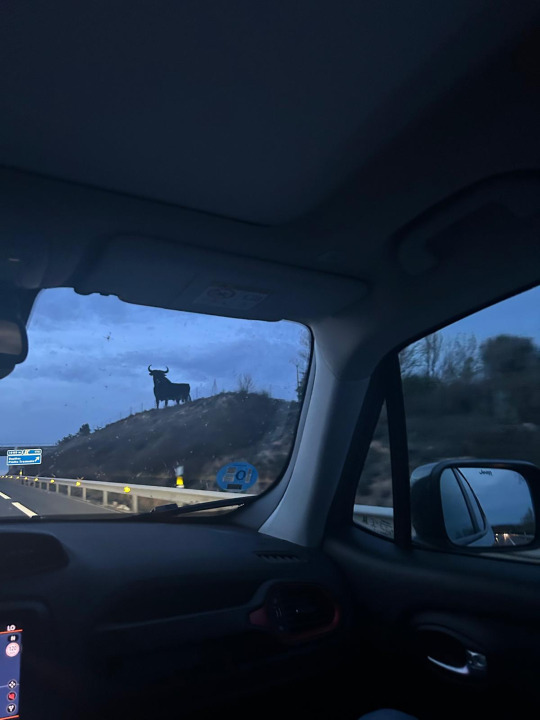
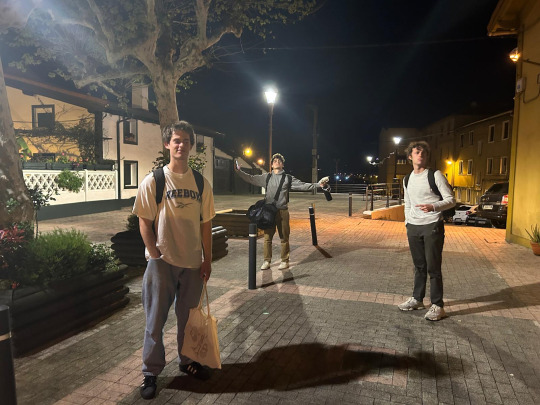
Huh? Yes, I was as confused as you probably are the first time I read that word. Especially the tx, which is pronounced as ch in Euskera, the mysterious language of the Basque people that has no known origin or connection to any modern tongue. It looks and sounds weird, and in the Basque country you’ll see it everywhere. It almost feels like it could have been spoken in some far off kingdom in Game of Thrones.
Speaking of, we went to Dragonstone, AKA Gatztelugatxe. Shout out whoever the location scout was for those scenes, because they absolutely killed it. The site was beautiful, and I think the pictures will speak for themselves.
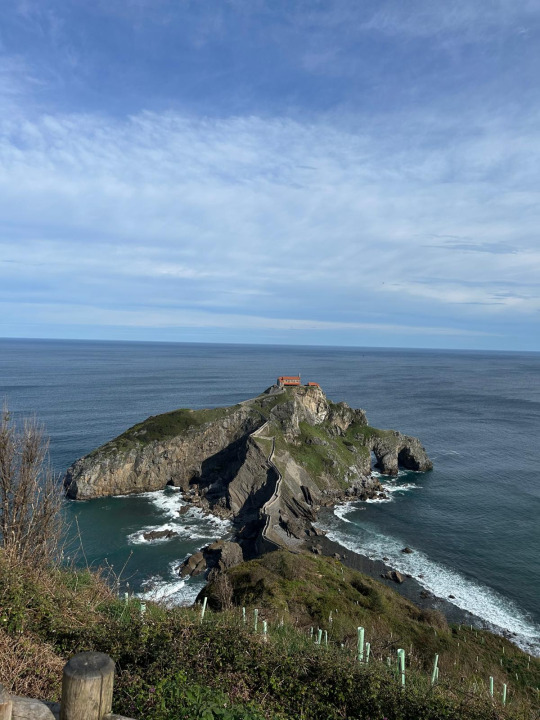
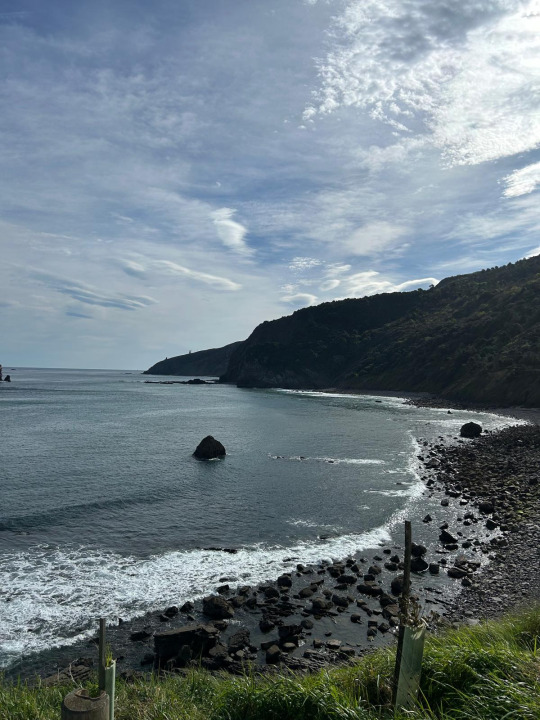
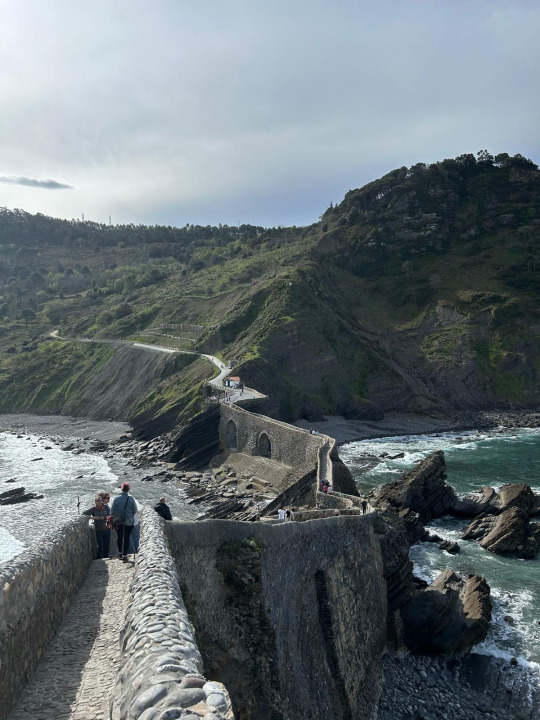
After that, we drove a few more hours to San Sebastian and explored. The energy was incredible. Sunny weather, beautiful city side beach, Burnt Basque cheesecake, calming sunset and delicious food (pintxos = tapas in Euskera!). There’s not much more that I can say other than the fact that simply walking around and taking it all in was an absolute joy.
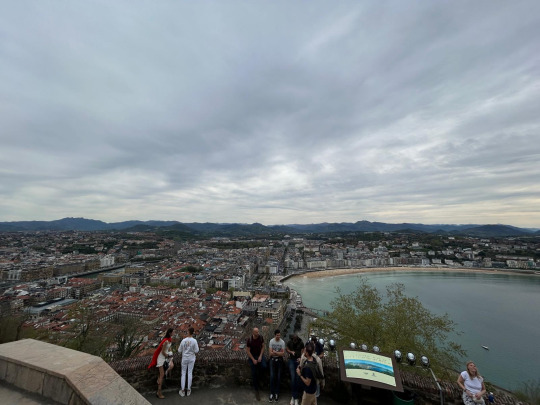
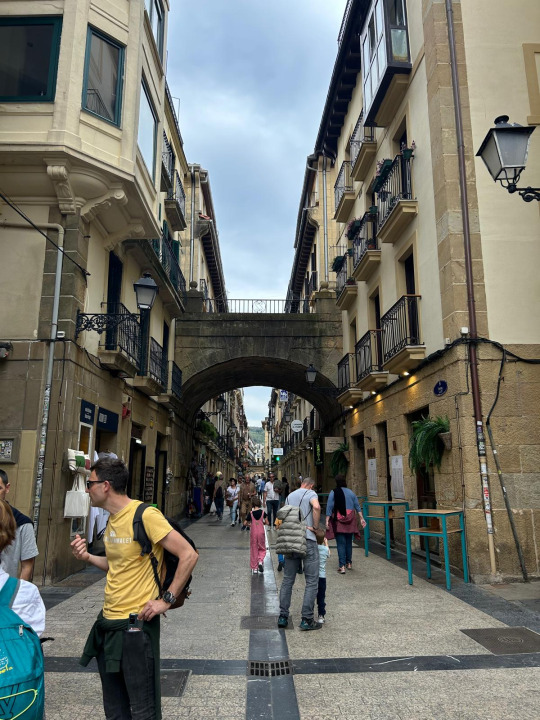
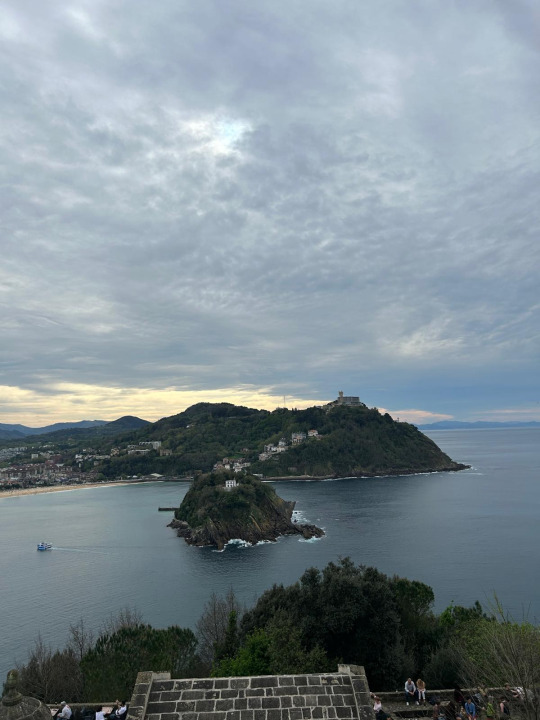
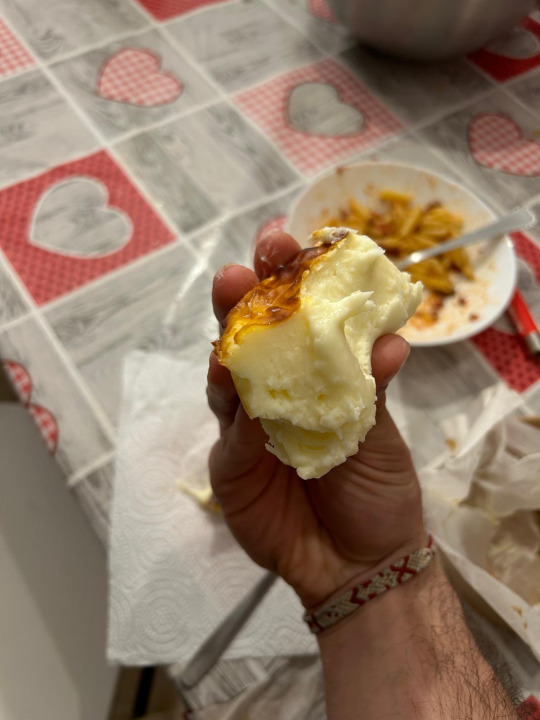
We proceeded to drive 4 hours west that evening to our second stop of the weekend: Picos de Europa national park (driving quickly through Bilbao, which has a really cool modern architectural style). We arrived at our Airbnb in the pitch black around 12 am, stumbled our way inside, cooked a comically oversized dinner (1.5 kg of pasta is too much for 4 people btw) and prepared for our big hike the next day.
The Hike
We woke up bright and early (it was like 10am) Saturday morning, ready for the 7.5 mile, 3000 foot climb ahead of us. I’d done a 13 miler with a similar increase in elevation once before in the Texan desert (Marufo Vega trail in Big Bend, highly recommend), so I wasn’t too concerned with the difficulty — only with whether we picked a worthwhile trail. I was silly for underestimating “Lon - Río Burón - Peña de Mañimoco”.
We started by driving into a tiny town in the national park, parking on the side of the road and setting off into a dirt trail that winded shallowly up the mountain. At this point, I was unimpressed. Most of our view of the mountain ahead of us was blocked by trees, and the path felt too well kept to be the basis of the true rugged backcountry experience I desired. Jokingly, we pointed to the top of the mountain we were hiking towards when we got to a clearing, asking damn, wouldn’t it be crazy if we went up there.
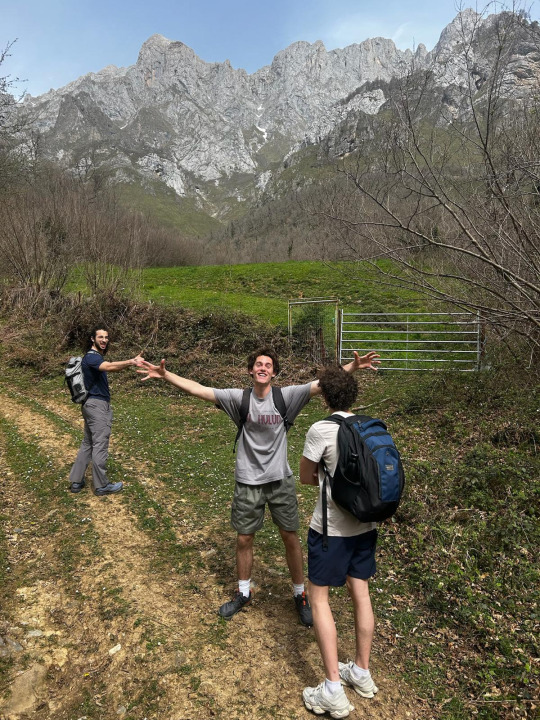
Yeah, it would have been crazy, but I guess 3000 feet is not to be underestimated, especially if you start at 1000. The paved trail split off into a smaller one once we broke through the treeline, which split off into a gravel shoot winding up the ridge of the mountain we had joked about a mile or two earlier. The wind started picking up, threatening to throw us off the mountain at any second as we climbed higher and higher (it was seriously intense wind. Jumping up, we actually caught a little extra airtime).
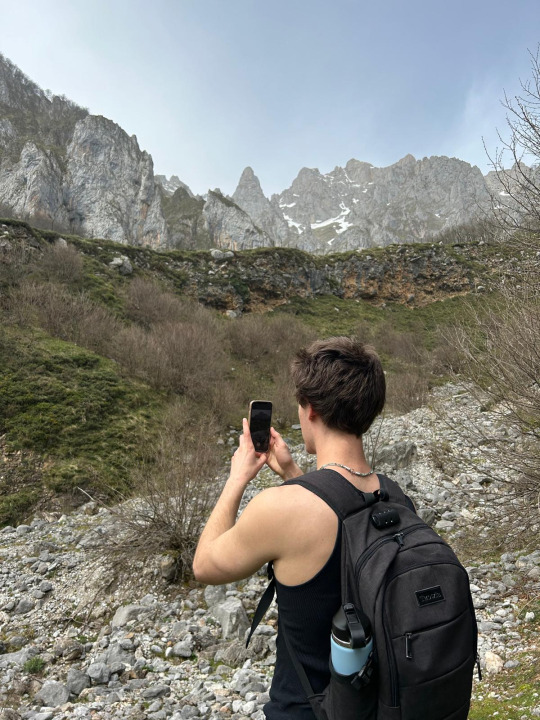
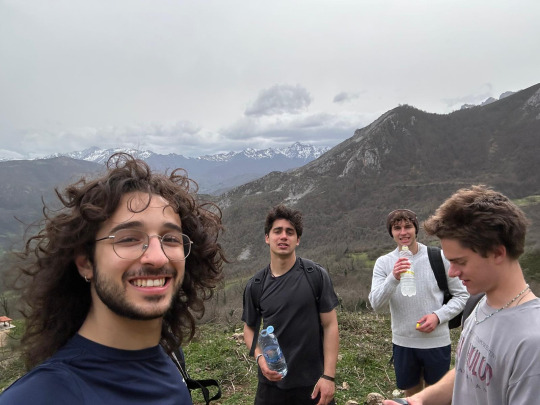
Each switchback revealed a view of the mountain and the valley below that was more stunning than the last. We passed through a huge diversity of different terrains, each so distinct they felt like Minecraft biomes stitched together. We even happened upon a herd of domesticated cows (which we were terrified of passing out of fear that they would attempt to butt us off the face of the mountain... we thought they were wild at first). At one point, we came across a meadow that looked like it came straight out of a studio Ghibli movie. We quite literally frolicked in the grass as another hiker (the only other person we saw on the trail) watched us from behind a tree, hiding from the wind. We talked to that guy later, we called him the Wind Wizard.
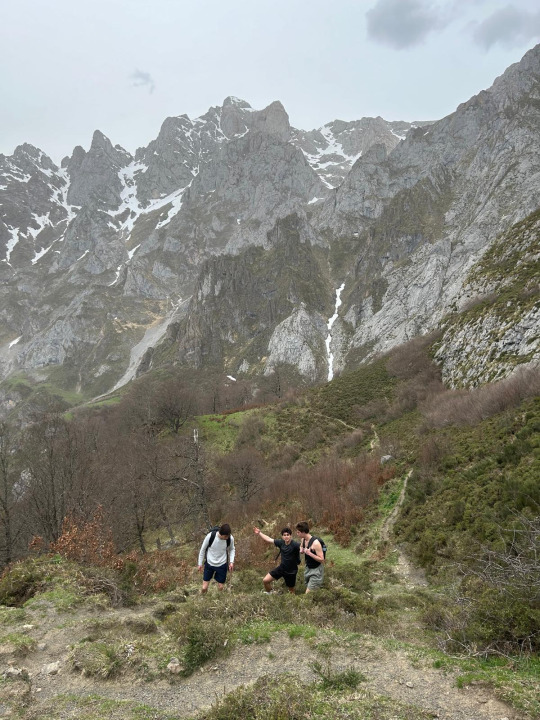
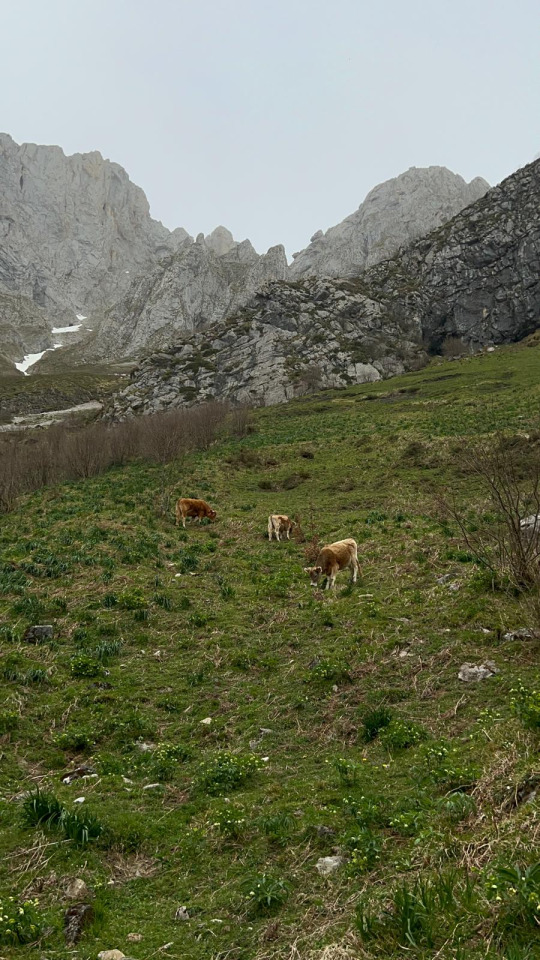
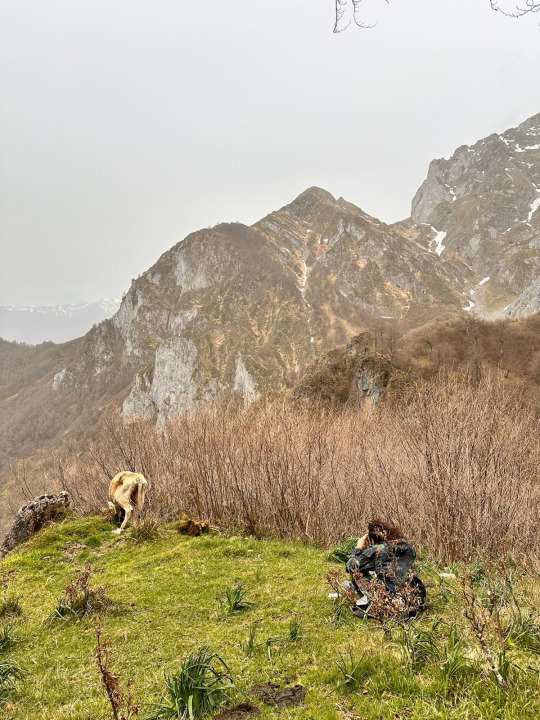
On this hike, I felt something reminiscent of the feeling I got as a 6 year old playing imagination games in the basement of my childhood home — unashamedly wide-eyed excitement. Looking out over the Picos de Europa (literally, the peaks of Europe) I couldn’t help but smile. This is the feeling I mentioned at the beginning of this blog that I think I can only experience whilst totally immersed in nature. At its core, it’s rooted in mindfulness and gratitude for the present moment -- something that I try to practice as much as possible in my everyday life.
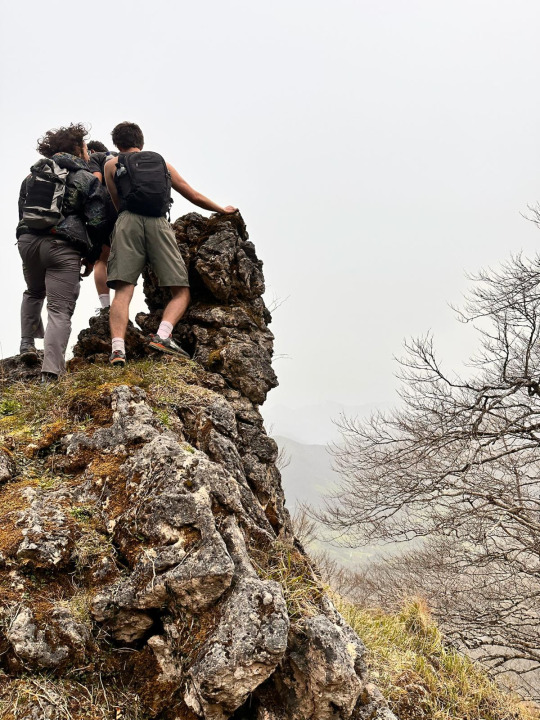
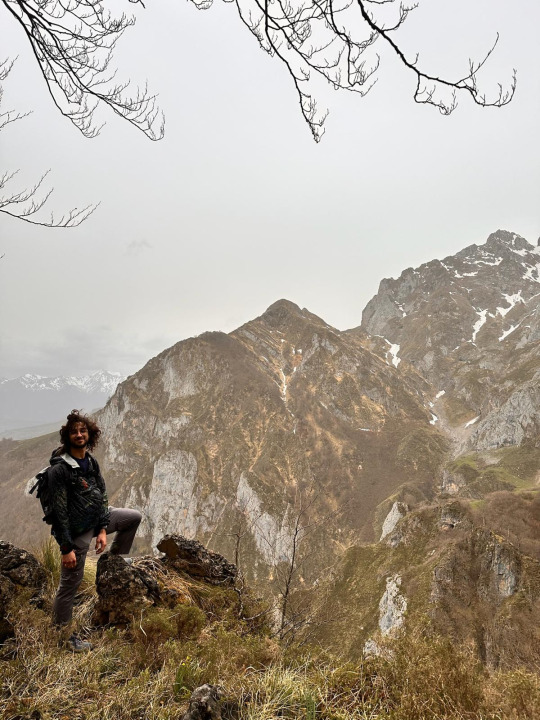
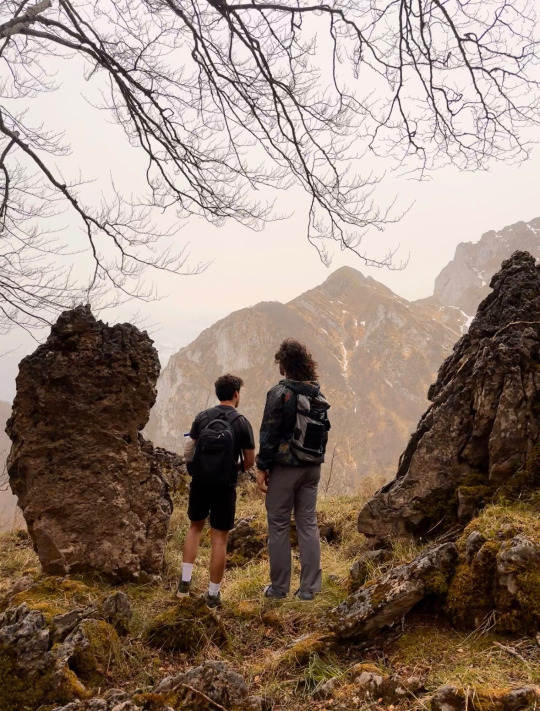
However, the reason this trip ended up being one of my favorites I’ve taken so far wasn’t just for the things that I saw — it was for the people that I spent it with. As much as I enjoy the independence and exploration of solo-traveling, I think that experiencing new things with trusted friends will almost always be more enjoyable. Being rooted in that feeling of wonder with others makes it feel more exciting, more significant, more real — both while it’s happening, and in the memories that stay with us forever.
We finished the hike with a steep decline down the mountain and ended up back at the car, where we drove into the larger town and got some drinks at a local cafe (where they had original craft beers on tap, and where I tasted the best Vermouth I've ever had). We left our airbnb early the next morning, but not before buying a block of cheese from the local Queseria (which was also absolutely fire). En fin, this was one of the most beautiful and rewarding hikes I've ever done, rivaled only by the aforementioned Marufo Vega. I think we chose well!
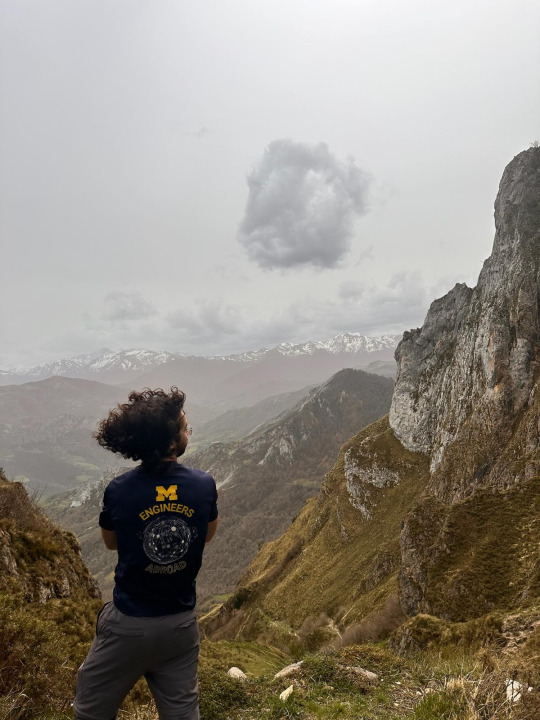
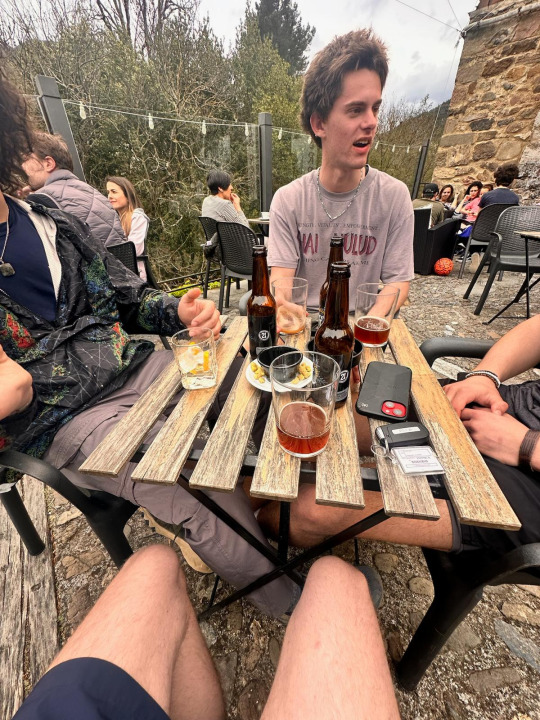
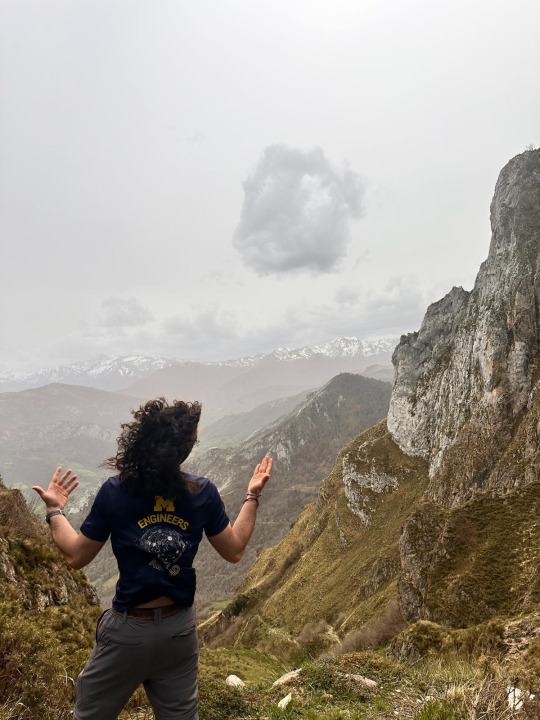
So, my key takeaways from this trip? Nature is awesome, and so is experiencing it (and life in general) with other people. At the end of the day, we’re just really smart animals who evolved (in nature) to be biased towards social behavior, so I guess that makes sense (#evolutionarypsychology?). I’ll be in the Bay Area this summer for an internship, and I’m really excited to go backpacking over the weekends in all of the epic nature that surrounds the area, meeting new people along the way.
Here's the itinerary list for this week's trip:
Basque Country Google Maps List
That’s all for this week’s blog! As always, check out the picture descriptions for a little more info. Thank you all very much for reading, and I’ll see y’all next week 🙂
Adios,
Niko Economos
Aerospace Engineering
Universidad Carlos III de Madrid
Madrid, Spain
2 notes
·
View notes